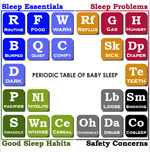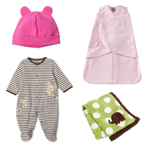 Babies are supposed to be sleeping most of the time. And yet, getting a baby to sleep is often difficult. The purpose of this site is to help parents get their babies to sleep, and keep them there. As long as possible.
Babies are supposed to be sleeping most of the time. And yet, getting a baby to sleep is often difficult. The purpose of this site is to help parents get their babies to sleep, and keep them there. As long as possible.
First, some credentials. I have a daughter (age 2) and twin boys (age 7 months). By the age of 5 months, all of them were sleeping through the night. That is, from midnight to 7 a.m. By seven months, they were sleeping from 7 p.m. to 7 a.m. Believe it or not, this is what pediatricians say your baby should be doing (or at least capable of) by six months of age. The problem of reaching this point is two-fold: first, how to get your baby to sleep. Second, ensuring that he or she sleeps as long as possible.
Part 1: Getting the Baby to Sleep
Getting babies to sleep does not take luck or a certain knack. It takes learned skills and practice of a routine. In my experience, to go to sleep, a baby needs to be:
- Well-fed. This is the most important one. A baby’s strongest instinct upon being born is to eat, and if he’s not fed, he’s not going to sleep. Not for long, anyway. See nighttime feeding and sleep.
- Clean and dry. In the grand scheme of things, it is worth the extra 45 seconds and $0.24 to put a baby in a fresh diaper, no matter that you changed him half an hour ago. There’s one diaper that will almost certainly help your baby sleep longer. Read about it in the importance of diapers for sleeping.
- Burped out. Unresolved bubbles in the tummy will either keep your infant awake, or make him spit up. Neither will help him sleep. See how to burp a baby for some tips.
- Warm and snug. This means tightly swaddled in a temperature-controlled room. For newborns, a soft hat is a good idea as well. See my post on what a newborn should sleep in for more.
With these four parts in place, and knowing some soothing techniques, your chances of getting the baby to go sleep are pretty good. But that’s only where the challenge begins.
Part 2: Keeping the Baby Asleep
It doesn’t do you much good to get the baby to sleep if you’re (1) still holding him, or (2) he wakes up fifteen minutes later. Here, a few strategies can help ensure that the baby will stay asleep. Rule number one: put the baby in bed before he falls asleep. This is a common mistake that new parents make – they believe that the baby can only fall asleep in their arms. If you establish and follow a bedtime routine, the baby will fall asleep on his own. Even better if you’re out of the room with the door closed before he drifts off. That leaves less noises that might wake him up.
Most babies can sleep right through a certain amount of noise, particularly if they’re accustomed to it. Case in point: each of my twins will usually keep on snoozing even if his brother is screaming his lungs out. Even so, in the baby’s room, it should be either totally quiet or have a low-level white noise. I’m talking about something that hums, like a baby soother or sound machine. Not a TV, radio, or anything that beeps.
Next up, pacifier. The hospital-issued Soothie is a popular one. If your baby will take one, keep two or three in the crib so that you can always grab one. Better yet, use a pacifier clip
to ensure that one’s always in reach. If a sleeping baby starts to fuss, don’t say a word. Don’t pick him up. Give him his pacifier, tuck the blanket even snugger around him, and tiptoe out of the room. Babies need to learn to soothe themselves, and this is a good way to get them started.
That’s enough to get you started. In subsequent posts, I go into more detail on establishing the routines and keeping the baby comfortable enough that he’ll start logging some real sack time. And when he does, so will you.
What To Read Next
If you like this article, you might want to subscribe by e-mail or RSS so that you’re notified when new content is posted.
 |
 |
 |
 |
| Baby sleep problems takes you through the most common sleep issues and how to address them. | The periodic table of baby sleep has all the essential elements for healthy baby sleep habits. | Visit our sleep training section for strategies and tips for teaching your baby to sleep through the night. | Check out our reviews of Essential baby gear for helping babies sleep at night. |